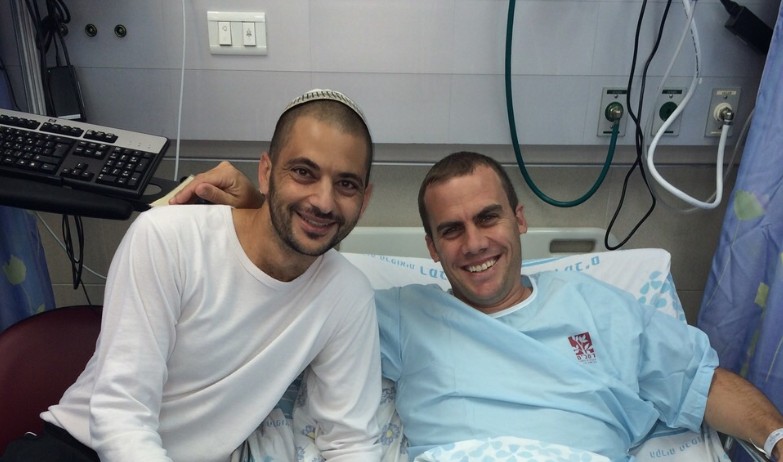Personal Stories
A Gift of Life: The Incredible Story of a Kidney Donor Who Saved a Stranger
How one father of six transformed another man’s future — and what you need to know about living kidney donation
- Yishai Yosef
- |Updated

Lior, 34, was an ordinary healthy man. He got married, had three children, worked for a living, and lived a quiet life in Kiryat Shmuel. One day, his kidneys stopped functioning.
The role of the kidneys is to filter toxins from the blood. When they fail, there is a need for a treatment called dialysis. It’s an unpleasant treatment, to put it mildly, in which machines draw blood from the body, clean it, and return it. The treatment is needed several times a week and lasts for several exhausting hours each time. Needless to say, dialysis does not allow for a normal life routine, and it affects work, income, and just about everything else. In his distress, Lior turned to the organization Matnat Chaim (“Gift of Life”) and needed to wait patiently for a kidney donor among the 700 (!) people on the waiting list that year.
A Birthday Gift
“I arrived in the evening. They surprised me. I got there exactly on the 5th of Cheshvan, my 34th birthday. I couldn’t have received a better birthday present — a gift of life,” says Lior.
“You got something really good,” the doctor told Lior. “This doesn’t happen every day.” Usually it takes a new kidney a few days to start functioning fully, but with Lior it happened immediately.
“Gabi grew a kidney for me in his body for 35 years,” Lior says emotionally, “and now it’s inside me. I’ll guard it with everything I’ve got.”
“People think that if a person has two kidneys, then if one gets damaged by illness, the second one will save them. That doesn’t hold up in reality,” says Gabi Revivo, 35, married and a father of six from Peduel, trying to dispel people’s fears about donating a kidney. “All those who need a transplant will testify that the disease damaged both kidneys together — and it was specifically one healthy kidney donated to them that saved their lives.”
Medicine is not a foreign world to Gabi, nor is the idea of saving lives. In his youth he volunteered with Magen David Adom (the national emergency service), in the army he served as a medic in Lebanon, he worked for years as a paramedic, and today he works in marketing advanced medical devices. And still, he had an old dream he felt he had to fulfill…
What Led You to Take This Step?
“For many years I wanted to do this. My wife says it goes back even to before we got married — maybe 15 years. In the last two years I heard about the organization Matnat Chaim, I heard different stories and was very moved. Over the past year I got a green light from my wife, and I went for it. I wanted to take it from thought to action.
“Eight months ago, there was a case involving someone close to me, and that accelerated the idea for me. But no doubt it’s also connected to my work in MDA with patients. When you see people suffering all the time, when you’re in daily contact with them, you want to ease their suffering. There are things you can do — but there are illnesses for which you have no medical solution. Here, in the case of a kidney transplant, you give a kidney — and the problem is solved in the simplest way. Two to three weeks you’re out of commission, but afterwards, God willing, everything goes back to normal.”
Is There a Risk in Donating a Kidney?
“It’s all a matter of how you define it. If someone’s son needed a kidney, any father would agree to donate. The same is true for a child donating to a parent, like in the case of Rabbi Avraham Ravitz, where the children argued among themselves over who would get to donate a kidney.
“People need to understand that in terms of risk — yes, there is general anesthesia and there is surgery, but the level of risk is very low. You have to remember that even when someone brings a child into the world, in a sense he is putting his wife at risk. I once discussed this with someone in my community and told him: ‘You put your wife at risk in childbirth.’ Women, God forbid, can die from a C-section.
“The point is that people want a child of their own, a life that belongs to them, and they feel a sense of connection to that child. A C-section doesn’t stop women from having more children. In our case too, the surgery is relatively simple, and the fear becomes small compared to the act itself.
“Even if there are complications, they usually affect only the first weeks, but not beyond that. And if we go to the farthest possibility, that one day you yourself might need an organ transplant — the Ministry of Health gives priority on the waiting list to people who have previously donated an organ, as a form of reward for their donation.”

“Dad, Are We So Selfish?”
Naturally, Gabi’s family did not remain indifferent. “My wife supported this all the way,” Gabi says. “She was a bit worried at first about the surgery, but once she understood that the process is simple, and once you understand what mutual responsibility is and what the meaning of this act is — everything else becomes small.”
“The kids were amazing. My son said to me: ‘Dad, are we really that selfish? If 700 people donated every year, there would be no more people in need.’
“I showed a video to my daughter, and she said to me: ‘Dad, this is a big act. I always thought only women can bring life into the world. Now I understand that men can too.’ When the children came to the hospital, they were very emotional.”
Were There People Who Tried to Talk You Out of It?
“There were those who said maybe it’s not responsible, because I have six children. I respect their opinion and their concern. Still, based on what I know about the subject, I was sure there was nothing to fear.
“My wife was worried that I’d have a hard time with the pain, but I told her it would be fine — and it really is fine.”
How Did You Decide Whom to Donate To?
“Once you’re medically approved as a donor, they find you a ‘match’. They have to find someone compatible with your blood type. They check that your kidneys are healthy, and you do blood tests to make sure everything is in order. If there’s even a small problem, they won’t take the risk.”
Describe the First Meeting With Lior and His Family
“It’s hard to describe. It’s a rare experience. His father saw me from afar and asked: ‘Are you the kidney donor?’ I asked him, ‘How do you know?’ He said, ‘We’ve been waiting for you.’ There was a lot of gratitude from him and from his wife.”
And the Meeting After the Surgery?
“It was a wonderful feeling to see that everything was okay. To realize that Lior no longer needs dialysis, and that, God willing, his entire life and his family’s life are going to change completely, from one extreme to the other. It’s a privilege that fell to my lot.”
A Word to Those Who Are Afraid?
“They need to be told there is nothing to be afraid of. It’s a simple act that gives you the opportunity to save a human life, to allow people just like you and me to live. It’s an act of gratitude — to say to God: ‘You gave me good, I’m giving good to others.’”
The Ruling of Maran Rabbi Ovadia Yosef
It is permitted — and even a mitzvah, for a person to donate one of his kidneys to save the life of a fellow Jew who is in danger due to kidney disease. This mitzvah is worthy of providing immense spiritual protection. In any case, it should certainly only be done through expert doctors, and “one who keeps a mitzvah shall know no evil.”

